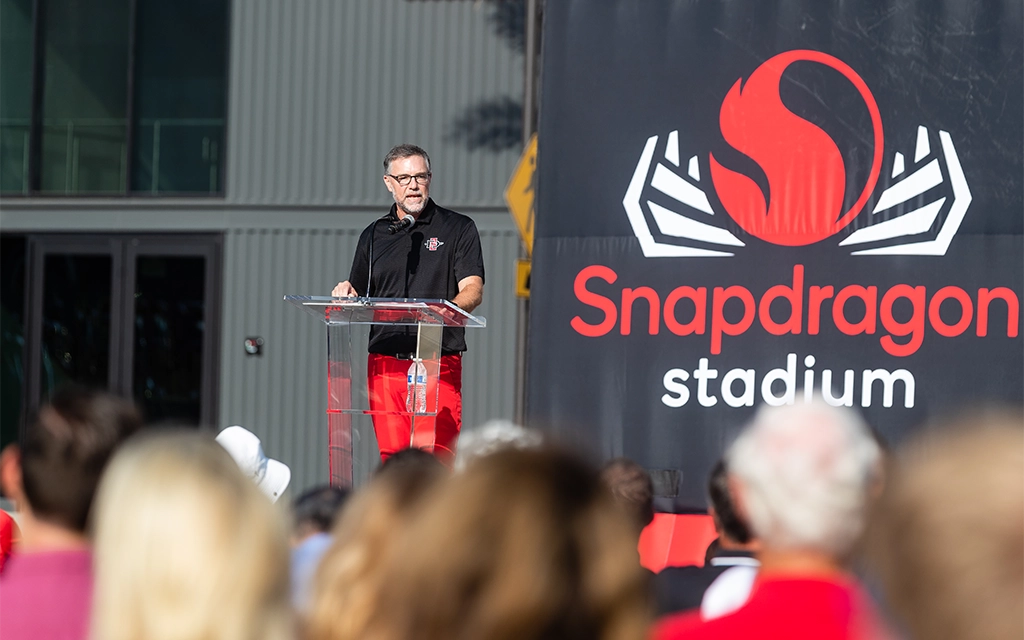
Fellow Mississippi State University alums remember Hattiesburg native and current director of athletics at San Diego State University John David Wicker as driven, intensely focused and somewhat of a workaholic.
Wicker says that description is “fairly accurate,” but said his wife, Rachel, and daughters, Scarlett Anne and Waverly Lile, “have helped me try harder to be a little more balanced.”
With his parents in the medical profession, Wicker learned that some careers carry more than 9-to-5 responsibilities. He said his father, an in-demand neurosurgeon, modeled his work ethic on the ideal: “Others you serve are important, and giving everyone the best you are is a work in progress.”
But Rachel Wicker is a realist about the hectic, hurried life that the man she calls “Wicker” has chosen and how that impacts their young family.
“We learned pretty quickly that when his work and his obligations take him away from us, you don’t take it personally. This life was what he always wanted. Our life motto is ‘there’s always something,’” she said.
“It’s not that Wicker doesn’t want to come or that the family’s schedule is not a priority, it’s that it’s his job,” she continued. “Things come up, and it’s good for the girls to watch and learn good work etiquette. They know their dad is extremely good at his job and they’re proud of him. Kids learn it’s okay for him to take pride in his work.”
The Wicker family resides in Santee, California, to be within commuting distance of the university. But there is a price to pay for Rachel–a native of the Pacific Northwest– and the girls.
“We don’t have extended family near us, we don’t have traditional support,” she explained. “I’ve adjusted my viewpoint on how structured our family was going to be. I needed to view my job as being a mom. If I don’t get milk, we don’t have milk.”
How did the Wicker family make that adjustment?
“The thing about Wicker is that when he’s here, he’s fully here,” Rachel Wicker said. “It’s so great when he is here, it makes the absences even harder holding our family and our house together.

“He has such good intentions, navigating all these things,” she continued. “As his family, we are happy to work with him. I sense that the staff at SDSU is likewise proud to work with him and for him. People genuinely enjoy his leadership. He is a good man. At the end of the day, it’s that he cares. That makes it all worthwhile.”
Wicker graduated from Mississippi State in 1992 with a bachelor’s degree in professional accountancy. He impressively landed his first job after college as an auditor for the “Big Five” accounting firm Arthur Andersen’s Jackson office.
“I just wasn’t happy driving a desk and it just didn’t fit with what I wanted to do,” Wicker said. “Sports management degrees were not common back then, so my ‘aha!’ moment came when I saw graduate school opportunities in sports management and a faster path to a career in athletics.”
After leaving Arthur Andersen, Wicker served as venue logistics manager for the Atlanta Committee for the 1996 Summer Olympic Games at the University of Georgia’s Sanford Stadium, home to the medal rounds for men’s and women’s soccer. He then joined the staff at Georgia from 1996-99 as assistant director of event management. Wicker earned a master’s degree in education with an emphasis in sports management from Georgia in 1997.
He returned to Hattiesburg to serve the University of Southern Mississippi as director of event and facility operations from 1999-01. Wicker then was named associate athletic director for event and facility operations at Washington State University in Pullman, Washington.
Wicker served as SDSU’s deputy athletic director from 2011 until departing for Georgia Tech in July 2015. During his first term at SDSU, he was responsible for the day-to-day operations of the Aztec athletics department, overseeing business operations, human resources, events and facilities, capital projects, strength and conditioning, academics, and video, as well as providing sport oversight for football, rowing, and men’s and women’s basketball.
The South Carolina native was introduced as SDSU’s new director of intercollegiate athletics on October 24, 2016. In the first 100 days of his tenure at SDSU, the NFL Chargers pulled up stakes and moved to Los Angeles, the Aztec’s Hall of Fame basketball coach Steve Fisher retired and the SDSU president who hired Wicker left the school.

SDSU reported: “Wicker led a potentially thorny process to get Snapdragon Stadium to the finish line last season on time and on budget, bringing together the city of San Diego, the university and the athletics department in a way that kept the $310 million project on budget and on time for a 2022 opening–during the COVID pandemic.”
Erik Judson, CEO of San Diego-based JMI Sports and a longtime friend of Wicker’s, had a bird’s eye view of Wicker’s reaction to those challenges while he led the Snapdragon Stadium project.
“He assembled a great team and then he was an inspirational leader,” Judson told the Sports Business Journal’s Michael Smith in 2023. “He’s patient, he leads, but he lets the experts be the experts. He’s often the smartest guy in the room, but he doesn’t try to assert himself that way.”
For Wicker, his time at Mississippi State was a time of self-discovery and growth.
“Mississippi State gave me the opportunity to be involved on campus and develop the leadership traits that make one successful,” Wicker said. “I earned a great education there, enabling me to get a good job right out of college. I had a lot of fun with my Kappa Alpha friends and serving as an alumni delegate.”
Recognized as one of the nation’s most innovative and successful sports management professionals, Wicker remains extremely proud of his home state and his alma mater.
“It goes back to my parents, who taught me that the success of those around you really defines your success,” Wicker said. “My time in Starkville, the great love I have for MSU, the years there, and the friends I made are foundational parts of who I am today and how I define success.”
By Sid Salter, Photos Submitted

